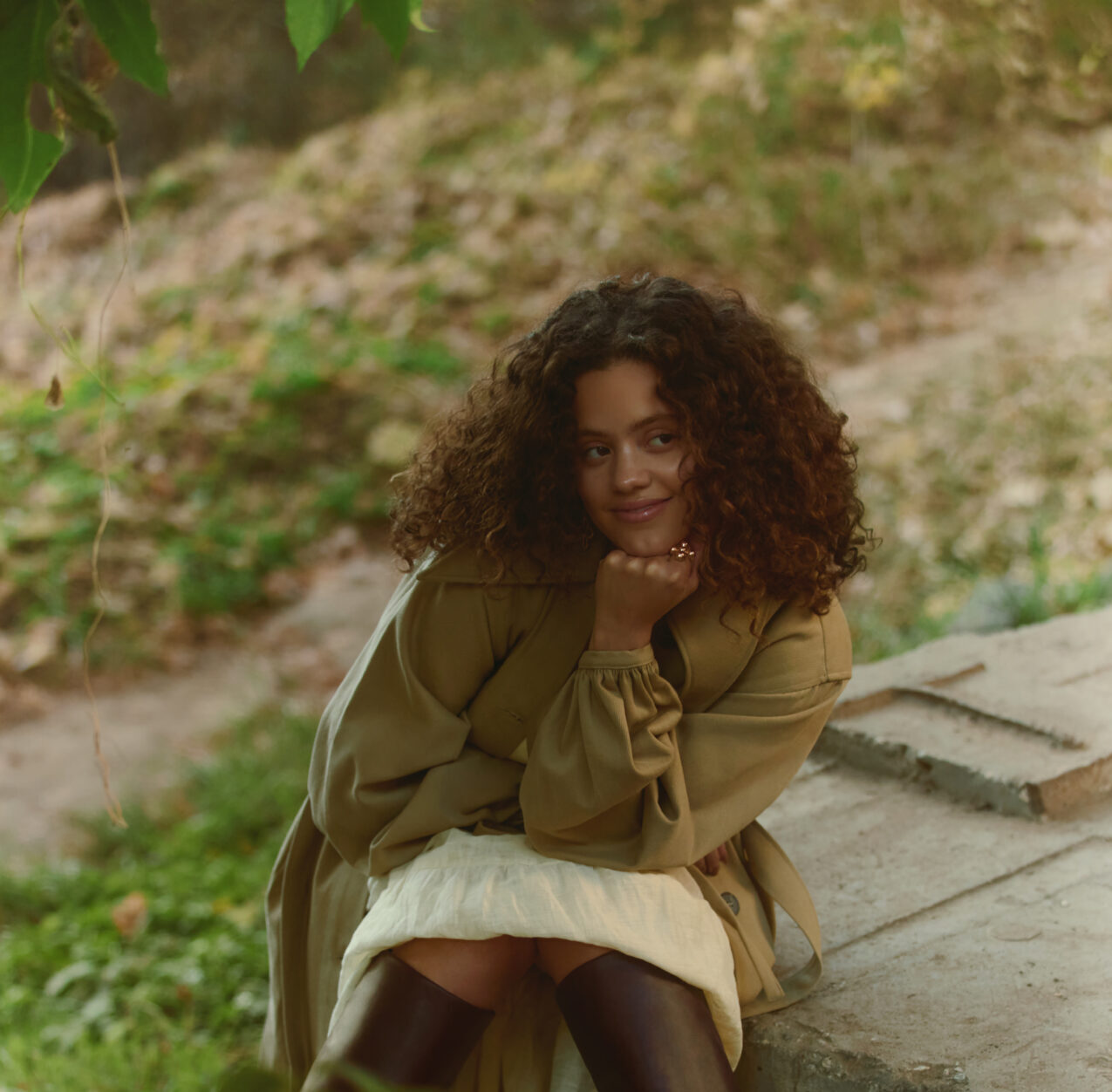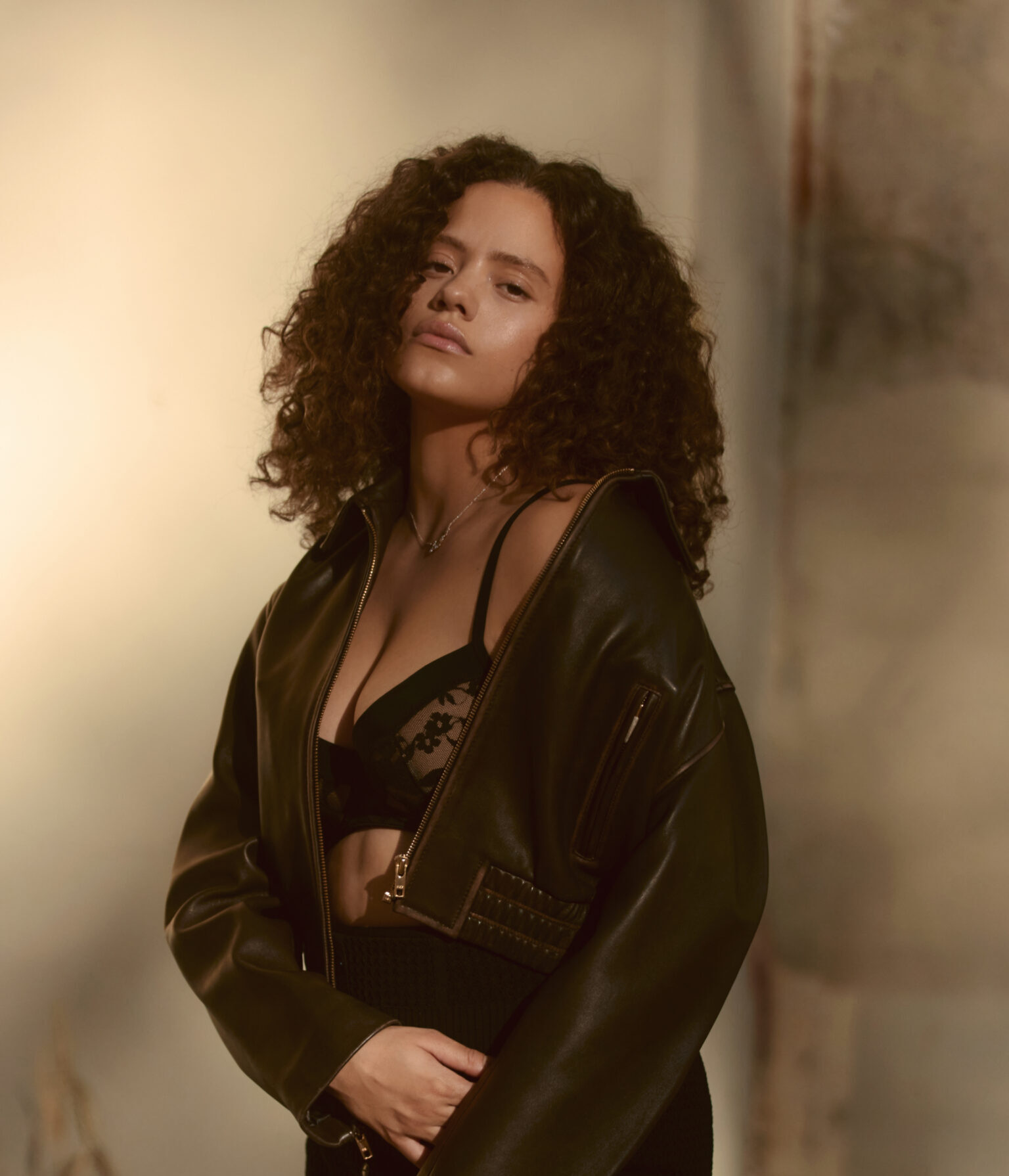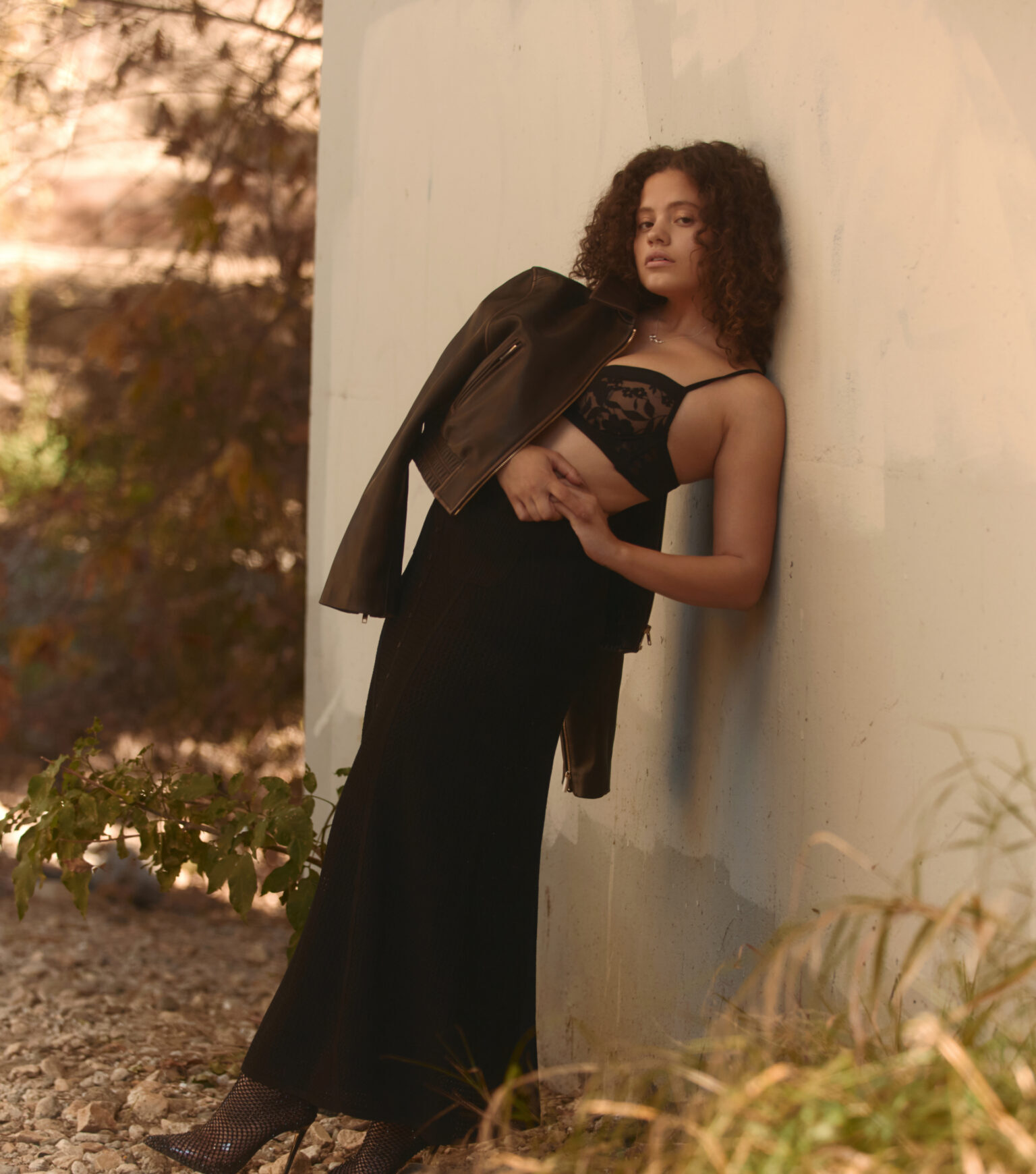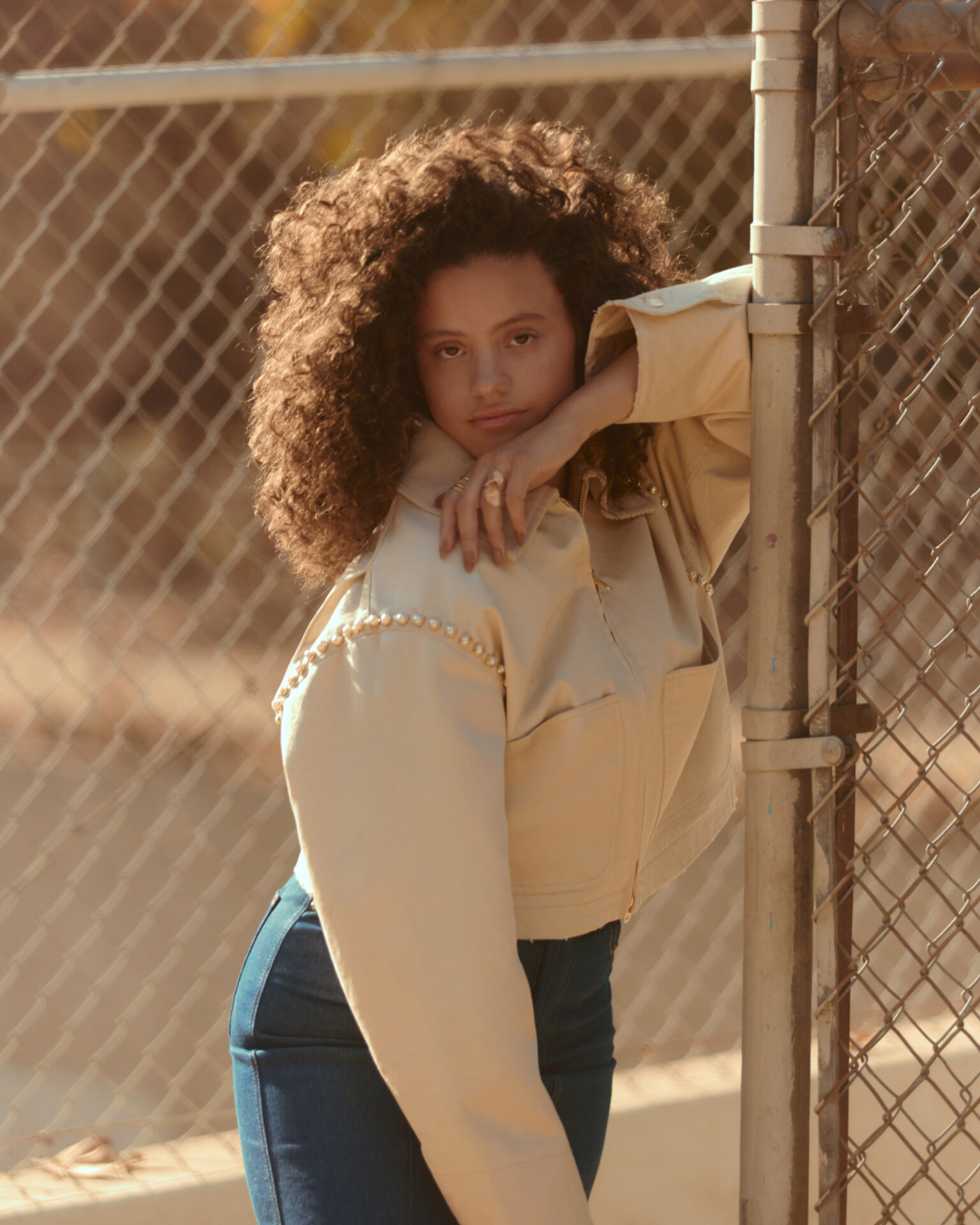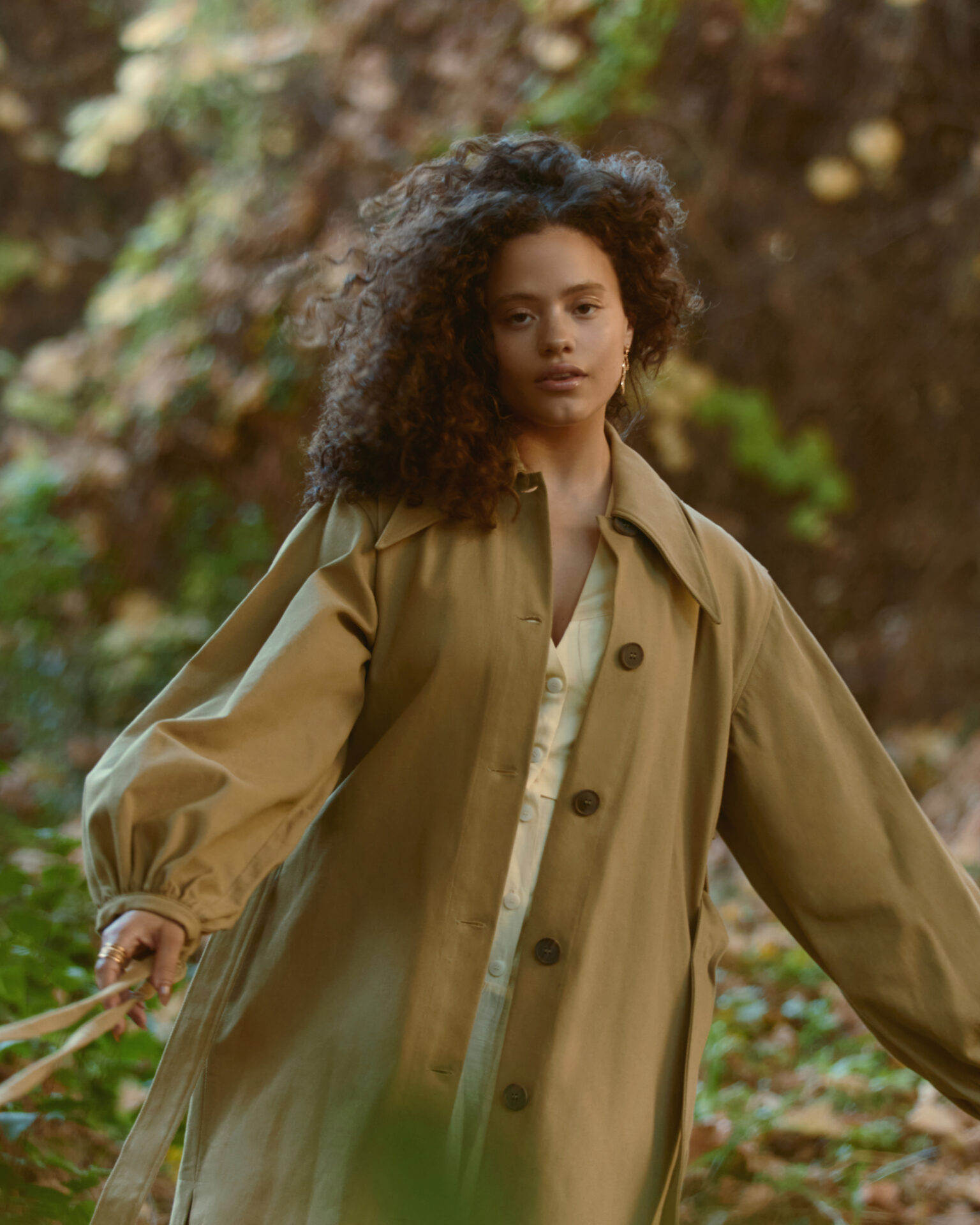Sarah Jeffery: acting with advocacy at the core
Writer: Chris Saunders
Acting is often about transformation – stepping into a role that feels far removed from real life. But sometimes, a character feels inevitable, as if the universe aligned to bring them together. That’s the case with Tecie, Sarah Jeffery’s upcoming film, where she plays a fiercely dedicated animal rights activist whose love and convictions lead her into tragedy. For the 29-year-old, born and raised in Vancouver, the story isn’t just another compelling narrative – it’s deeply personal.
We meet over Zoom the following day of the Oscars, where Jeffery stayed up late watching the night’s biggest moments. One highlight stood out: the Wicked performance, a theatrical spectacle that resonated with her in a way few might find surprising. Before television and film, Jeffery’s first love was the stage. She started performing at just three years old, training in dance, music, and theatre, long before she became known for her screen roles. That early foundation shaped the way she approaches storytelling – finding the emotional truth in a performance, whether through movement, music, or acting.
Now, In Tecie, she steps into a story that feels like an extension of herself. Directed by Mark Webber and featuring an original score by Moby, the film explores activism, love, and the sacrifices that come with standing by your principles. Jeffery, a longtime advocate for animal rights, doesn’t just play an activist – she embodies the values that have long shaped her offscreen life.
This isn’t the first time she has chosen a project that speaks to something bigger. In Six Triple Eight, she was part of an ensemble cast bringing to light the story of the first and only all-Black women’s battalion deployed overseas during World War II. The film honors the 6888th Central Postal Directory Battalion, which sorted millions of backlogged letters and packages for American troops, ensuring soldiers could receive long-overdue messages from home. It’s a history that had largely gone untold, and being part of the project allowed Jeffery to help share a story of resilience, service, and recognition long overdue.
With Tecie, she continues that journey, stepping into a role that blurs the line between performance and purpose. It’s not just about bringing a character to life – it’s about amplifying a movement. As the film prepares to make its way into the world, Jeffery isn’t just playing a part; she’s telling a story she believes in.
Chris Saunders: So, let’s start off with your upcoming role in Tecie. Could you talk me through how you got involved with the project? I read that it’s one very close to your heart.
Sarah Jeffery: I’ve been going to the Mercy for Animals Annual Gala for four or five years now. It’s a dinner where they honor animal advocates within the industry. They also honor what they call “hidden heroes” – people who go into factory farms and take footage illegally. I was presenting this past year and was seated at a table with Moby and the producer, Lindsay Hicks, who’s also on the film. Moby asked, “Are you an actor? What are you here for?” And I said, “Yeah, I’m an actor and an animal advocate.”
SJ: He immediately said, “Well, I have this movie we’re doing. Let’s exchange info, because you seem great.” So he, Lindsay, and I exchanged contact information. I thought, “Maybe they’ll ask me to read for it.” Then I met with Mark Webber, the director, and they offered me the role right away. They said I kind of was the character, so they didn’t see a point in having me audition.
CS: It must be pretty rewarding being involved in a project that’s so close to what you care about.
SJ: Yeah. It was pretty surreal. I’m so grateful that everything happened the way it did and that I was seated with them. Actually, the casting director for the project, Amy René, had cast me in a film three or four years ago, and she already had me in mind to pitch to them before they even met me. So all these things just came together.
CS: Does that influence your approach at all? Do you prepare differently, knowing it has such a personal connection?
SJ: I don’t know if I’d say differently, but there’s definitely a preciousness to it… yet also almost an ease. Especially because, from the start, they were like, “Oh, you are this character.” How I prepare for projects differs from film to film, show to show. For this one, I didn’t do a ton of character homework. I really felt like I was this character, so it was about being as present as possible. I did a lot of meditating and reflecting on why I’m an animal advocate in my own life.
CS: How did you get into animal advocacy?
SJ: I’ve always loved animals dearly. My aunt has been vegan for 30 years, so I’d always been exposed to veganism, but for some reason, I never really considered it until I moved to New York for a show. A friend of mine – who’s now my best friend – said, “You know, I’m vegan, and you should consider it because of X, Y, and Z.” And I was like, “Yeah…” Then another friend of mine said, “You can’t love animals and eat them.” And I thought, “I don’t know if I buy that.” But then I watched a documentary called Earthlings, and it was a very disturbing watch—just gut-wrenching. And I just… went vegan. From then on, I’ve had so much compassion for animals. But I also have compassion for people. I understand that maybe it’s not an accessible diet for everyone. There’s almost a disconnect. So for me, it’s really been about educating people and encouraging them to educate themselves as well.
CS: What would you say is your spirit animal?
SJ: Ooh. I’ve always seen myself as kind of like a lion cub. I love lions! Though I don’t know if I have a lion’s personality. I’d say I’m maybe more of an otter. Something playful. But my hair is naturally very curly, so I always thought, “Oh, I have a lion’s mane.”
CS: Do you have any pets at the moment?
SJ: I have my little rescue chihuahua. She’s the most chill chihuahua I’ve ever seen and doesn’t make a peep. I love all animals, but I wouldn’t have thought I’d own a chihuahua, just because they’re typically very yappy. But she is truly the best. She’s so quiet and well-behaved. And I have a Frenchie as well. His name’s Monty.
CS: Going back to the film, you mentioned the director, Mark Webber. What was it like having him as a director? How does he get the best out of you?
SJ: Best experience ever. He’s a very collaborative person. Just zen and chill. There’s definitely a desire to make it the absolute best it can be, but it never feels forced or like there’s a ton of pressure. Sometimes, when you get on a set, it can be really stressful because you want to make it the best you possibly can, but with Mark, it never felt like we were in a rush to arrive somewhere. He just allowed for a lot of space, collaboration, and exploration. We did a lot of improv. I just felt so at ease. He creates such a warm environment.
CS: Had you worked with him before, or was this the first time?
SJ: No, I hadn’t. I was somewhat familiar with his work –not so much as a director, but more as an actor. And I’ve been a fan of his wife, Teresa Palmer, for a long time. The more I looked into his work, I realised – oh wow, he’s really an indie film darling. I was so excited. Honestly, it was the most beautiful experience ever.
CS: Was there a particular moment during filming that felt especially rewarding or creatively fulfilling?
SJ: Yeah. I’m typically a very nervous person and quite anxious. But during this whole project, I had this sense of ease that made it feel like a one-of-a-kind experience.
CS: Do you feel like you put a lot of pressure on yourself?
SJ: I do. I want it to be the best it can be. I don’t want to let myself, my castmates, or the crew down. I care about it a lot. But Mark just brought such a warmth to the set that I felt completely at ease. There’s a scene – well, I can’t say too much because it would give away the whole film – but I had been so nervous for it. And I told him that, and he was like, “There’s no rush, nothing to worry about.” And when we shot it, I felt like he was able to get the best possible performance out of me. It felt like a release… like I was purging something personal.
CS: What do you hope people take away from the story, either emotionally or thematically?
SJ: I really hope people open their eyes to the cruelties of factory farming and animal cruelty in general. Vegans have different approaches to how they share veganism with others. My approach is that if we reprimand people or get angry at them, it’s not going to change their minds. So I hope the film gently guides people in the right direction. I haven’t seen a final cut yet, so I don’t know how it’s all come together, but I really hope it encourages people to do their own research and open their eyes to the reality of what goes on behind slaughterhouse doors. Even starting with plant-based meals a couple of days a week – just that alone makes a difference. I’d rather have so many people doing it imperfectly than just a few doing it stringently. That’s my personal take.It feels like the film has come at such an interesting time. I’m not sure if you’ve seen how many people are trying the carnivore diet right now? It’s become this massive trend, and it’s kind of scary.
SJ: It’s really wild. There’s just so much information and misinformation out there, and it’s hard to dissect what’s true. I see people eating sticks of butter for breakfast, and I’m like, “Surely that can’t be healthy?” I don’t know – I’m not a doctor, obviously – but surely that can’t be good. To your point, it’s a confusing time. I just think, find what works for you, and try to do it in a kind way. That’s my best advice.
CS: Shifting gears – speaking about some of your previous roles, you were in The Six Triple Eight. Could you talk to me a bit about that experience? What was it like for you?
SJ: Oh, it was so special. Another project that, for different reasons, is super impactful and will always be a part of me. It’s based on a true story. When I read the logline for the film and got the audition, I assumed it was fictional, but it’s completely based in reality. These women were real women – Black women and women of colour – who sorted through 17 million pieces of mail during World War II and did it in three months. It’s kind of incomprehensible that they accomplished this while being severely underestimated and degraded. They got the job done, but they didn’t receive the accolades at the time. Now, being part of giving them their flowers is just so cool and meaningful.
CS: Do you feel more of an added pressure when working on a story like this – one based in reality? Like you have a responsibility to get it right?
SJ: Yes, I would say so. Your job is to honor these women and completely put ego aside. I’m a conduit for this story and for these women. I think remembering that allowed me and the rest of the ladies in the cast to do the best we could and give the best performances we could. We got to Zoom with one of the women who was played in the film by Ebony Obsidian. Her name is Lena Derriecott Bell King, and she was 100 when we spoke to her on Zoom. Speaking to someone who is 100 years old is like, wow, so much wisdom. She had lived so much life, seen so much. But then, to speak to her about this specific experience we were portraying, it was totally surreal. She was a total spitfire… so lovely and vivacious. You would never believe she was a hundred. Unfortunately, she passed away just before her 101st birthday, but she did get to see the first cut of the film. Tyler [Perry] flew to her and showed it to her on an iPad. She was just chuffed.
CS: That’s amazing. Segueing from that, I wanted to talk about the state of America right now. Politically, it’s all over the place. Do you think that’s going to impact the future of mainstream cinema and TV? Do you feel like certain stories might be missing or not getting the limelight they deserve?
SJ: I fear that we’re trending toward censorship. And that’s the last thing we can afford in film and television, for better or for worse. You know, like No Other Land. Did you see that it won [Best Documentary Feature Film at the Oscars]? That acceptance speech… it was such an important moment. Shining a light like that has the power to change people’s minds and do really, really meaningful work. But I’m scared that with the [Donald Trump] administration, that opportunity will lessen and lessen until we are silenced. It’s very scary times we’re living in, and I think we just have to get loud, support each other, and survive.
CS: With that in mind, I wanted to touch on some of the challenges you’ve faced in the industry over the years. How do you maintain your authenticity in an industry like this?
SJ: I would say the biggest challenge for me in this industry… well, first, just being a woman in the industry. The landscape has changed for the better since the Me Too movement.
SJ: Obviously, there’s still work to be done, but for the most part, there’s now an empowerment and a sense that you won’t be fired for speaking up if you’re uncomfortable. But also, just being a biracial woman. My dad is Black, my mom is white. People often describe me as “ambiguous,” and that makes it difficult to find a place and a community to belong to. For a lot of roles, I’m not white enough. But then for a lot of roles, I’m also not Black enough. It’s this strange in-between. In terms of keeping myself authentic, I think one of the greatest gifts The Six Triple Eight gave me was the opportunity to explore and celebrate my Blackness unashamedly. For a long time, I felt like because I can be white-presenting in certain spaces, I wasn’t allowed to fully embrace or claim my Blackness. And this film gave me an opportunity to do that on screen with my lovely castmates, who really supported me and brought me into the community.
CS: Is there anything else you have coming up for the rest of the year? Do you have a release date yet for Tecie?
SJ: There’s not a release date yet. I’m hoping toward the end of the year. I know they’re still in the edit. But I’m actually going to SXSW next week for a pilot I did… an independent pilot. I’m really excited to show people and hopefully find a home for it. Other than that, I’m just excited for what’s on the horizon. I’m excited to explore being behind the camera. I’d really love to direct. Maybe 2025 is the year of producing and directing. I feel really excited about this year. It’s been slow for the industry. It’s a weird time, but I do feel like there’s an energy shift happening, and that makes me hopeful.
PHOTOGRAPHER RAUL ROMO
VIDEO ADDISON O’CONNOR
MAKE-UP ARTIST KASHA LASSIEN
HAIR STYLIST SHERRIANN COLE
Stylist BRANDEN RUIZ
STYLING ASSISTANT ISSAC FLORES
